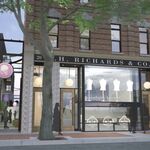archited
Senior Member
There are 22 factors that go into the economics of "build" or "don't build" -- don't be fooled by over simplicity.
That is actually crazy - surprised we haven't seen similarly wild market appreciation...yet. I am glad I bought when I did, who knows what the competition is like out there now for house purchases.One of those wild stats. In first half of 2024 Edmonton saw the most home sales of any market in the country https://edmontonglobal.ca/news/edmonton-leads-in-housing-metrics/
This is one of the main reasons we are not seeing more construction of multi family downtown and elsewhere right now, SFH prices here are still affordable compared to elsewhere.One of those wild stats. In first half of 2024 Edmonton saw the most home sales of any market in the country https://edmontonglobal.ca/news/edmonton-leads-in-housing-metrics/
The good news is that Edmonton is one of the only municipalities that has consistently increased housing starts, without a recent drop. A lot of chatter at real estate and development conferences use Edmonton as a case study in city administration.Wow, I love that by the time I want to buy/rent in a few years, even Edmonton will be expensive and competitiveTime to look in Winnipeg or Saskatoon!
For real though, I want more multi-family infill but if that only happens because everything gets 25% more expensive, that's gonna be rough for a lot of people.
It would put us on par with Calgary.
It may be premature for the political class to give themselves too much credit and pat themselves on the back too hard. It is easier to relax zoning rules in an environment with moderate demand, but when that increases there are more conflicts and issues.The good news is that Edmonton is one of the only municipalities that has consistently increased housing starts, without a recent drop. A lot of chatter at real estate and development conferences use Edmonton as a case study in city administration.
The bad news is that our strategic direction is attracting so much investment and population that it's creating a risk of displacing locals, particularly those in single-family homes.
The good news is that Edmonton is one of the only municipalities that has consistently increased housing starts, without a recent drop. A lot of chatter at real estate and development conferences use Edmonton as a case study in city administration.
The bad news is that our strategic direction is attracting so much investment and population that it's creating a risk of displacing locals, particularly those in single-family homes.
It may be premature for the political class to give themselves too much credit and pat themselves on the back too hard. It is easier to relax zoning rules in an environment with moderate demand, but when that increases there are more conflicts and issues.
You'll probably see that happen soon, BILD Edmonton Metro's advocacy on single-egress buildings has gotten quite a lot of traction.Edmonton has definitely been a trendsetter and I'm so proud of us for that. Going further is going to be important in the near future, though, and I believe Edmonton will look at more forward-thinking policies such as single-egress buildings. They are less expensive to build and have flexible floorplans, which is super important if we wanna see more affordable 3-bedroom units being built.
Only thing is, the province would have to change the building code and idk how likely that is to happen
If rents are non-economic and little continues to be built as a result, your friends and kids might be able afford things but there won’t be anything available for them to rent.Do we want $3500 for 2bdrms though? Like I want to see Development explode as much as the next person. But I also want my friends and kids to be able to afford to live in this city.
Ideally a lack of building would drop prices for labour and materials if the supply/demand of economics works. But obviously that’s not happened elsewhere. So idk the solution. But rent being 45-65% of the average person’s take home surely isn’t sustainableIf rents are non-economic and little continues to be built as a result, your friends and kids might be able afford things but there won’t be anything available for them to rent.
The people who move into the more expensive nice newer buildings will create space in decent older buildings for other people to rent at more affordable rates. So new construction is not a bad thing at all, even if the price is higher.If rents are non-economic and little continues to be built as a result, your friends and kids might be able afford things but there won’t be anything available for them to rent.
In theory yes; but a man's gotta eat Julien.Ideally a lack of building would drop prices for labour and materials if the supply/demand of economics works. But obviously that’s not happened elsewhere. So idk the solution. But rent being 45-65% of the average person’s take home surely isn’t sustainable
It's amazing how immigration without check, and a lack of rules regarding F.D.I. can throw the sustainability of a market out of whack eh?If rents are non-economic and little continues to be built as a result, your friends and kids might be able afford things but there won’t be anything available for them to rent.




